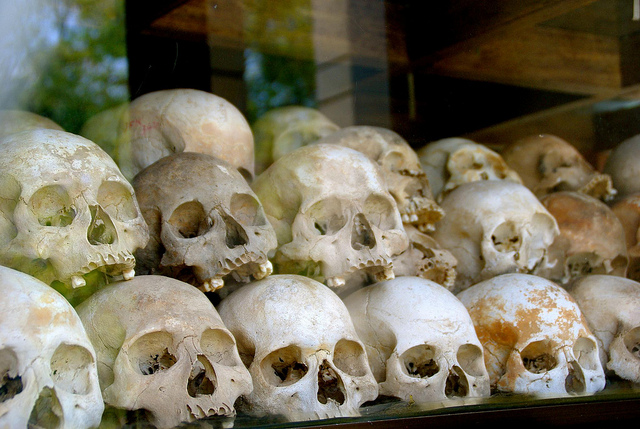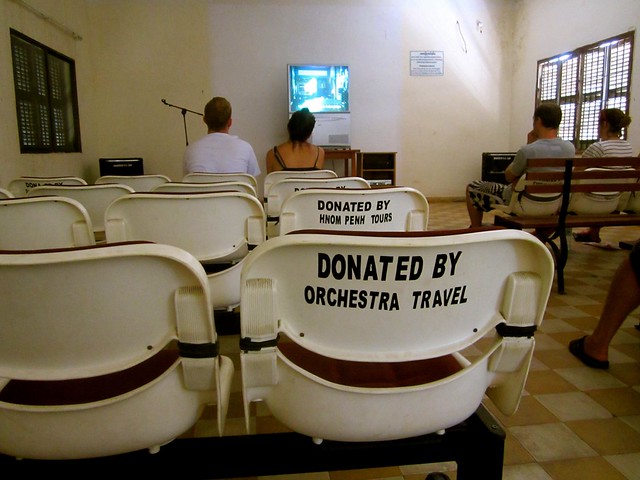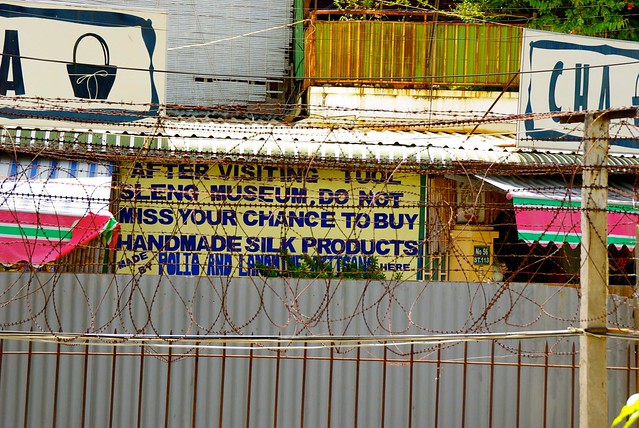These travel days are never easy to get through but also important to understand the country you are visiting. We spent the day at the S-21 Khmer Rouge prison and the Choeung Ek “Killing Fields” in Phnom Penh, Cambodia. Learning about the tragedy and pain inflicted by the deranged Khmer Rouge is enough to make you question all of humanity.
Dark tourism is tourism involving sites related to death and tragedy. Examples are: the genocidal museums in Cambodia, concentration camps in Germany and Poland, Hiroshima in Japan, and Ground Zero in New York City. It’s critical for the world to remember the dark parts of history, in order to prevent them from happening again. But should there be a standard of decorum for how these sites are presented to visitors?
Some view dark tourism as exploitation and using tourist’s feelings of guilt and sadness to generate a profit. In truth, we went to Phnom Penh mainly to visit these two sites. We spent two days in the city and then left to see Angkor Wat in Siem Reap. After spending two hours walking around the prison and seeing photos of victims it felt a bit weird to see a brightly colored shop inside the grounds selling knick-knacks and souvenirs.
Our attention was drawn to this sign, just visible over the fence as you are on your way out:
It’s sort of funny, which is what makes it twice as sad. “Now that we’ve depressed you, buy, buy, buy!” Tourism is a vital part of the economy for many countries, and it’s necessary for people to spend to improve the quality of life for the people that live there. I’m not saying that historical places with a dark past shouldn’t be tourist sites. The information that we learned during this trip was heartwrenching and illuminating and understanding it helps us empathize with the Khmer people. But I do want to raise the question about using tragedy as a venue to attract tourists.
What has your own experience with “dark tourism” been and what are your thoughts?




Its true almost everywhere has had something horrible occur in their past, and I think its important to learn about them if you truly want to understand a culture. I can relate because there are many places in Barcelona that are sites documenting horrors that have occurred. But because they are crimes against the Catalan people, the Spanish government tries to conceal them, or just downplay their importance. Many times I learn about these sites from Catalan friends, they wouldn’t be found in any guide book! I also grew a much greater appreciation for Budapest after watching a movie that my couchsurf host gave me (that totally made me cry!) about their horrifying past. These experiences draw me so much closer to a place that I am an outsider in. And gift shops are to be expected I’d say, as long as they are items actually made locally then bring it on!
Completely agree with learning about tragedies of the past and not hiding them. It’s the blatant commercialization I have a problem with. There should be a certain level of decorum accepted at these sites.
Having spent a lot of time in Japan, I have visited both of the museums dedicated to the dropping of the atomic bomb in Nagasaki and Hiroshima. I’m glad I’m explored both of those museums so “dark tourism” – when done properly – can serve as a setting to educate visitors.
Good blog, Id tend to agree. I’d also relate this to religion and people using spirituality as a means to making money. Very hard subject all round really as like you said tourism and money are a means to improving life situation so regardless of venue people will always seek to profit..